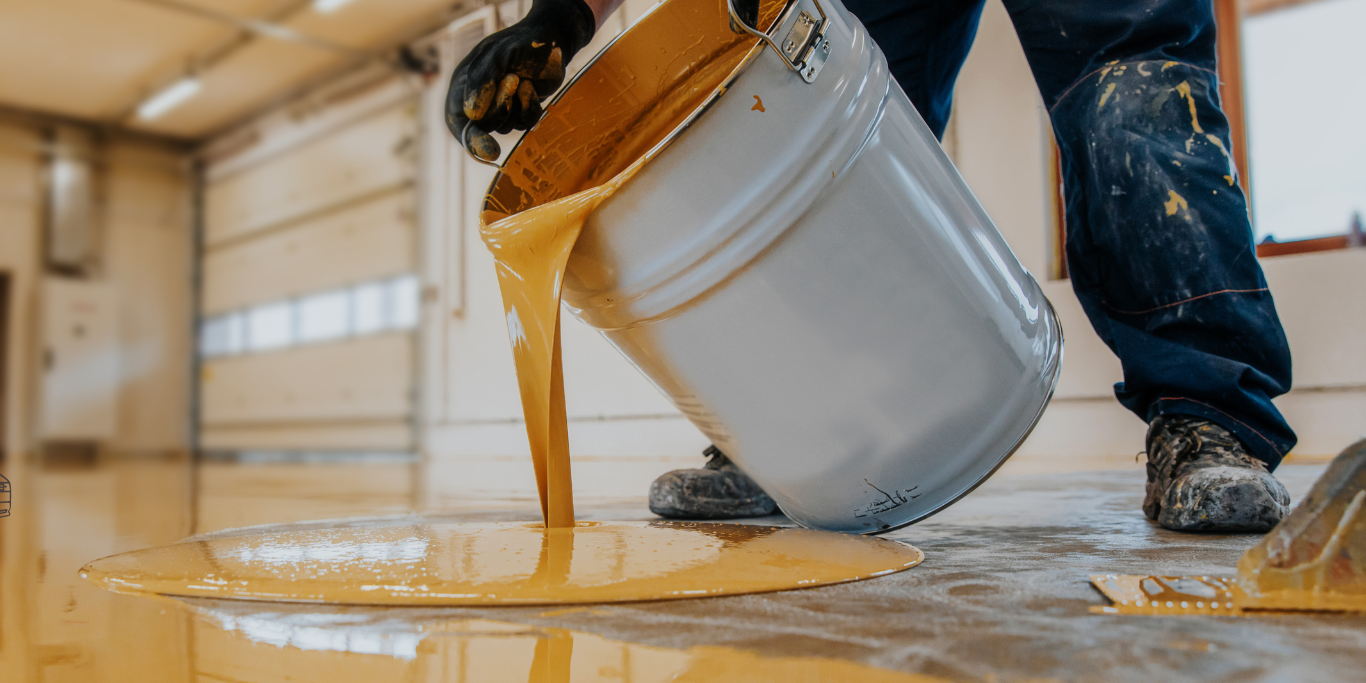Choosing the right floor paint or coating is crucial for both aesthetic appeal and long-term durability of your floors. Whether you’re revamping your home or renovating a commercial space, the decision you make regarding floor finishes can significantly impact the overall look and feel of the area. In this comprehensive guide, we’ll delve into the various factors you should consider when selecting floor paint or coating, ensuring that you make an informed decision that meets your needs and preferences.
Selecting the ideal floor paint or coating involves considering factors such as surface type, durability, application method, and environmental impact. By evaluating these aspects carefully, you can choose a product that enhances the appearance of your floors while providing lasting protection against wear and tear.
Surface Type
When it comes to floor finishes, one size does not fit all. Different surfaces require specific types of paint or coating to achieve optimal results. Concrete floors, for instance, may benefit from epoxy coatings due to their durability and resistance to chemicals and abrasion. Wooden floors, on the other hand, may require specialized paints that offer flexibility to accommodate the natural movement of the wood.
Concrete Floors
Concrete floors are a popular choice for both residential and commercial spaces due to their durability and versatility. When selecting a paint or coating for concrete floors, consider factors such as the level of foot traffic, exposure to moisture, and desired aesthetic.
Wooden Floors
Wooden floors add warmth and character to any space but require careful consideration when choosing a floor finish. Look for paints or coatings specifically designed for wooden surfaces, ensuring compatibility with the unique properties of wood such as expansion and contraction.
Other Surface Types
In addition to concrete and wood, other surface types such as tile, metal, and asphalt may require specialized paints or coatings. Evaluate the specific needs of your surface to determine the most suitable product for optimal results.
Durability and Performance
The durability and performance of floor paints and coatings play a crucial role in their long-term effectiveness. Selecting a product that can withstand daily wear and tear, as well as exposure to harsh elements, is essential for maintaining the integrity of your floors.
Traffic and Usage
Consider the level of foot traffic and usage patterns in the area where the floor paint or coating will be applied. High-traffic areas such as hallways, entryways, and commercial spaces may require more durable coatings to withstand constant use.
Resistance to Chemicals and Stains
Depending on the environment, floors may be exposed to various chemicals, oils, and stains that can degrade the finish over time. Choose a paint or coating with excellent chemical resistance to ensure long-lasting protection against spills and stains.
UV Stability
If your floors are exposed to natural sunlight, UV stability becomes a crucial factor in preventing color fading and degradation. Look for products with UV-resistant properties to maintain the vibrancy and integrity of the finish, especially in outdoor or sunlit areas.
Application Method and Ease of Maintenance
The application method and ease of maintenance are practical considerations that can influence your choice of floor paint or coating. Opting for products that offer easy application and simple upkeep can save time and effort in the long run.
Application Techniques
Consider the application method required for the chosen paint or coating, whether it’s brushing, rolling, or spraying. Choose a product that aligns with your skill level and equipment availability to ensure a smooth and professional-looking finish.
Drying Time and Curing
Pay attention to the drying time and curing process of the selected product, as this can impact the overall project timeline. Some coatings may require extended curing periods before full use, while others offer quick-drying formulas for faster turnaround.
Maintenance Requirements
Evaluate the maintenance requirements of the floor paint or coating, including cleaning procedures and frequency of touch-ups or reapplications. Selecting a low-maintenance product can simplify upkeep and prolong the life of the finish, saving you time and resources in the long term.
Environmental Impact and Sustainability
In today’s environmentally conscious world, considering the environmental impact and sustainability of floor paints and coatings is increasingly important. Opting for eco-friendly products can minimize harmful emissions and contribute to a healthier indoor and outdoor environment.
VOC Content
Volatile Organic Compounds (VOCs) are chemicals emitted as gases from certain solids or liquids, including many traditional paint and coating products. Choose low-VOC or zero-VOC options to reduce indoor air pollution and promote better air quality in your home or business.
Recyclability and Disposal
Consider the recyclability and disposal options of the chosen floor paint or coating to minimize environmental impact. Look for products that are easily recyclable or biodegradable, and follow proper disposal guidelines to prevent pollution and contamination.
Sustainable Ingredients
Some manufacturers prioritize sustainability by using renewable or plant-based ingredients in their paint and coating formulations. Supporting floor painting companies that prioritize eco-friendly practices can help reduce your carbon footprint and contribute to a greener future.
Cost and Budget Considerations
While quality should be a primary consideration when choosing floor paints or coatings, cost and budget constraints inevitably play a role in the decision-making process. Balancing quality with affordability ensures that you get the best value for your investment without compromising on performance or aesthetics.
Initial Cost vs. Long-Term Value
Evaluate the initial cost of the product against its long-term value and durability. While higher-priced options may have a higher upfront cost, they often provide superior performance and longevity, resulting in cost savings over time.
Return on Investment
Consider the return on investment (ROI) of the chosen floor paint or coating, taking into account factors such as lifespan, maintenance requirements, and potential savings on repairs or replacements. Investing in quality products upfront can yield significant returns in terms of durability and performance.
Budget-Friendly Alternatives
If budget constraints are a concern, explore budget-friendly alternatives without compromising on quality or performance. Look for cost-effective options that meet your basic requirements while offering adequate protection and aesthetics for your floors.
FAQs:
Q1. What is the difference between floor paint and floor coating?
The main difference between floor paint and floor coating lies in their composition and durability. Floor paint is typically a latex or oil-based product that provides a colored finish to the surface but may require multiple coats for adequate protection. On the other hand, floor coatings, such as epoxy or polyurethane, are thicker and more durable, offering superior resistance to abrasion, chemicals, and stains. While floor paint is suitable for light-duty applications and decorative purposes, floor coatings are preferred for high-traffic areas and industrial settings where durability is paramount.
Q2. How do I prepare my floor before applying paint or coating?
Proper surface preparation is essential for ensuring adhesion and longevity of the paint or coating. Begin by cleaning the floor thoroughly to remove dirt, grease, and debris. Repair any cracks or imperfections with suitable patching materials, and ensure the surface is dry and free of moisture. Depending on the type of floor and product being used, additional steps such as etching or sanding may be necessary to promote adhesion. Always follow the manufacturer’s instructions for surface preparation to achieve the best results.
Q3. Can I apply floor paint or coating myself, or should I hire a professional?
The decision to DIY or hire a professional depends on various factors, including your level of experience, the complexity of the project, and your time and budget constraints. While applying floor paint or coating yourself can save money, it requires careful preparation, proper application techniques, and attention to detail to achieve professional-looking results. If you’re unsure about the process or lack the necessary skills and equipment, hiring a professional painting contractor is recommended. Professionals have the expertise and tools to ensure proper surface preparation, application, and finishing, saving you time and hassle while delivering high-quality results.
Conclusion
Choosing the right floor paint or coating involves careful consideration of various factors, including surface type, durability, application method, environmental impact, cost, and budget. By evaluating these factors and prioritizing your specific needs and preferences, you can select a product that enhances the appearance of your floors while providing long-lasting protection and value. Remember to consult with professionals if you’re unsure about the best options for your project, and don’t hesitate to explore resources such as Floor Painting and Coating Services for expert guidance and assistance. With the right choice of floor paint or coating, you can transform your space and enjoy beautiful, durable floors for years to come.







